 Eine Ausstellung von Vida Bakondy und Amila Širbegovic für die Initiative Minderheiten, in Koop. mit den Büchereien der Stadt Wien (Web)
Eine Ausstellung von Vida Bakondy und Amila Širbegovic für die Initiative Minderheiten, in Koop. mit den Büchereien der Stadt Wien (Web)
Zeit: 14.09.–14.11.2020
Eröffnung: 14.09.2020, 19.15 Uhr
Ort: Hauptbücherei am Gürtel, Wien
„Es gibt zwei Sorten Flüchtlinge: solche mit Fotos und solche ohne Fotos, sagte ein Flüchtling aus Bosnien.“ Dubravka Ugrešic (2000).
Krieg und Flucht können uns alles nehmen. Besonders rütteln sie am Menschen selbst. Fremdbestimmt wird man im Ankunftsland auf den „Flüchtling“ reduziert. Was bleibt, sind oft nur Erinnerungen an die eigene, vielschichtige Identität: wer man einst war, vielleicht noch ist und eines Tages werden wollte. Die Ausstellung „Nach der Flucht“ widmet sich Geschichten von Menschen, die im Zuge des kriegerischen Zerfalls Jugoslawiens zu Beginn der 1990er Jahre flüchten mussten und in Wien ein neues Zuhause gefunden haben. Mit über 100.000 aufgenommenen Kriegsflüchtlingen war Österreich ein zentraler Fluchtpunkt, die größte Gruppe mit 85.000 Schutzsuchenden stammte aus Bosnien und Herzegowina. Ungefähr zwei Drittel von ihnen blieben dauerhaft in Österreich.
Erfahrungen und Erlebnisse der ehemaligen Kriegsflüchtlinge sind in der Geschichte der Stadt Wien und Österreichs bis heute unterrepräsentiert. Nach der erfolgreichen Integration in die österreichische Gesellschaft wurde ihnen kein öffentliches Interesse mehr zuteil. Sie wurden zu viel geschätzten Kolleg*innen am Arbeitsplatz, doch kaum jemand interessiert(e) sich für ihr Leben vor der Flucht und nach der Ankunft in Wien. 25 Jahre nach dem offiziellen Kriegsende in Bosnien-Herzegowina spürt die Ausstellung anhand persönlicher Erinnerungsstücke den Biografien von 14 Wiener*innen nach. Die gezeigten Objekte schlagen eine Brücke zwischen ihrem Leben vor der Flucht und danach. Sie vermitteln Einblicke in individuelle Erfahrungen von Krieg, Flucht und Neubeginn. Zum Vorschein kommen unterschiedliche Arten von Verlust, die mit dem Flüchtlingsdasein einhergehen: Verlust von geliebten Menschen, von Zuhause, von Zugehörigkeit und Erinnerung, von persönlichem Besitz, sozialem Status und staatsbürgerlichen Rechten. Die Geschichten stehen aber auch für das Weiterleben und für das Recht auf Erinnerung.
Als Begleitprogramm finden eine Podiumsdiskussion (22.09.2020, 19.00 Uhr) und 5 Ausstellungsgespräche statt. Beschreibung und Termine als PDF.
Gefördert aus Mitteln der Stadt Wien – Integration und Diversität.
Monthly Archives: August 2020
CfP: Queering Memory: Session at CAA 2021 (Event, 02/2021, NYC); by: 16.09.2020
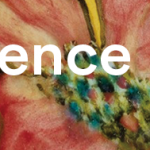 Session at CAA 2021: Valentina Rozas-Krause and Andrew M. Shanken (Web)
Session at CAA 2021: Valentina Rozas-Krause and Andrew M. Shanken (Web)
Venue: NYC
Time: 10.-13.02.2021
Proposals by: 16.09.2020
To say that women are under-represented in public space is a gross understatement: less than 7% of the existing monuments in the US recognize women. In response, cities are currently grappling with the striking gender disparity of their commemorative infrastructure by adding new monuments. This trend recapitulates the fact that women are under-represented in society, in history and in places of power, while it also assumes that one way to address the deficit is through memorialization.
Yet we all know how fraught memorialization is. Memorials are frequently victims of iconoclasm. In fact, memorials have been under near constant assault, from the statue-phobia of the 19th century through the counter-monument movement of the 20th century. Do we want to subject women–or women’s memory–to these same problems? Do we want an army of dead white women to counter these dead white men?
The question goes beyond women. The session seeks to understand the under-represented in memorialization, both diachronically and across cultures. Speakers could consider issues of gender, race, and otherness, as well as materiality, style, context, and history. They might further consider the public display of female and queer bodies and its relationship to a long history of white male bodies; and the historical relationship between the representation of allegorical and actual women. Moving beyond subject matter, how have women as memory activists shaped the commemorative landscape? We welcome papers across historical eras and geographical contexts that place commemorative representation in tension with feminism, queer studies and new materialism.
To submit a proposal, please follow instructions on the CAA Annual Conference CFP page (Link). Deadline for submission is September 16, 2020.
Valentina Rozas-Krause, University of Michigan and Andrew M. Shanken: Email Addresss: vrozas@umich.edu, ashanken@berkeley.edu.
Source: H-Net Notifications
Power and Privilege: WIENWOCHE 2020, 11.-20.09.2020, Wien
 9. WIENWOCHE. Festival for Art & Activism 2020 (Web)
9. WIENWOCHE. Festival for Art & Activism 2020 (Web)
Zeit: 11.-20.09.2020
Orte: verschiedene Orte in Wien
Das Programm der WIENWOCHE 2020 ist soeben online gegagen (Web).
Die Veranstaltungen können stattfinden – wegen der aktuellen Pandemiesituation allerldings mit begrenzter Besucher/innenzahl, und mit verbindlicher Anmeldung (Web)
Die 9. Ausgabe des Kunst- und Kulturfestivals WIENWOCHE hat „Power and Privilege“ zum Thema. Die Beiträger/innen beschäftigen sich mit etablierten, bewussten oder unbewussten Zuschreibungen kultureller und sozialer Macht und stellt die Frage, wie Privilegien, besonders wenn sie als solche nicht erkannt werden, zur Aufrechterhaltung eines von struktureller Gewalt geprägten Systems beitragen.
“(In)equalities derived from race, ethnicity, class, gender, and their intersections place specific groups of the population in a privileged position with respect to other groups and offer individuals unearned benefits based solely on group membership; historical and systemic patterns of disinvestment in nonprivileged groups are major contributors to the low social and economic position of those groups; representation of groups and individuals in media, art, music, and other cultural forms create and sustain ideologies of group and individual inferiority/ superiority (…).” Bonnie Thornton Dill and Ruth Enid Zambrana.
Das intersektionale Kunst- und Kulturfestival öffnet mit mehr als 180 teilnehmenden Künstler/innen, Aktivist/innen und Akteur/innen urbane und nicht-kommerzielle Räume sowie etablierte Kulturorte. Die Projekte beleuchten aktuelle gesellschaftspolitische Debatten wie Umverteilung, kulturelle Teilhabe, Armutsproduktion, Zugang zu Wohnraum ect. aus (post-)migrantischer, queer-feministischer, dekolonialer Perspektive und widmen sich brandaktuellen Themen wie neu aufflammenden Nationalismen in der europäischen Grenzpolitik, rassistischer Polizeigewalt, Zugang zum Wahlrecht für alle oder LGBTQIA+ Rechten.
WIENWOCHE ist ein Wiener Festival, das mit der Verschmelzung von kreativen Praktiken und Aktivismus experimentiert: in unterschiedlichen Größen und Formaten und von verschiedenen Seiten der Kunst und sozialer Bewegungen. WIENWOCHE findet seit 2012 Continue reading
Klicktipp: Die Wurzeln der Sozialdemokratie (Radiointerview)
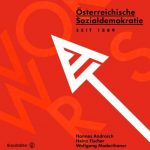 FALTER-Radio: Podcast von Raimund Löw #380 (Web)
FALTER-Radio: Podcast von Raimund Löw #380 (Web)
In der 380. Folge des Podcast „FALTER-Radio“ diskutiert der Journalist Raimund Löw mit Historiker/innen zum Thema „Sozialdemokratie und Geschichte“. Eine Frage ist dabei, wie die Wurzeln der Arbeiter/innenbewegung in Österreich die Aktualität prägen. Diskutiert werden auch Entwicklungen in der geschlechterspezifischen Politik der sozialdemokratischen Bewegung.
Gesprächspartner/innen sind die Historikerin Gabriela Hauch, der Historiker Wolfgang Maderthaner sowie die Journalistin Barbara Tóth. Der Beitrag dauert ca. 28 Minuten (Web).
Die Diskussionsteilnehmer/innen haben die folgenden Bücher zum Thema geschrieben:
- Gabriela Hauch und Karl Fallend: Aus der Sintflut einige Tauben. Zum Leben von Elisabeth Schilder (Zur Geschichte der Sozialarbeit und Sozialarbeitsforschung, Bd. 12), Wien 2020 (Web)
- Hannes Androsch, Heinz Fischer und Wolfgang Maderthaner (Hg.): Vorwärts. Österreichische Sozialdemokratie nach 1889, Wien 2020 (Web)
- Barbara Tóth und Thomas Hofer (Hg.): Wahl 2019. Strategien, Schnitzel, Skandale, Wien 2019 (Web)
CfP: Working women in agriculture (19 to 21 centuries) // Women workers as writers (Event: 09/2021, Vienna); by: 15.09.2020
 4th ELHN Conference: ELHN Feminist Labour History Working Group: Eloisa Betti (Univ. of Bologna), Leda Papastefanaki (Univ. of Ioannina) and Susan Zimmermann (Central European Univ.) (Web)
4th ELHN Conference: ELHN Feminist Labour History Working Group: Eloisa Betti (Univ. of Bologna), Leda Papastefanaki (Univ. of Ioannina) and Susan Zimmermann (Central European Univ.) (Web)
Time: 30.08.-03.09.2021
Venue: Vienna, Austria
Proposals by: 15 September 2020
The Feminist Labour History Working Group invites papers which address the following two large themes:
Working women in agriculture (19 to 21 centuries)
The role of women in the agricultural context has been crucial in the modern age in all parts of the world, but has often been neglected and disguised in scholarship. Papers may address the various forms of work performed by women in the rural context, as well as their mobilization to obtain better working and living conditions, equal wages, the recognition of their legal status including the property of the land. The nexus between the productive and reproductive sphere could be a lens to read the transformations and continuities across centuries and different spatial contexts.
The connection between women’s work in agriculture and political ideologies could be an additional vantage point from which to address the changing role and perception of female workers in 19th and 20th century societies. Rural women have played an important role in environmental movements in the 20th and 21st centuries. Mechanization needs to be studies from a gendered point of view, looking at the different impact on women’s work and men’s work. The feminization of agricultural work both in the Global North and South could be addressed, by investigating the changing gender relations as well as commodification of former subsistence-oriented work, and the developmentalist policies of international agencies such as the ILO have been characterized by a strong focus on women and agricultural labour.
Women workers as writers
Women belonging to the working classes have left myriad traces of their literary skills and passion for writing. Diaries, correspondence, memoirs have been the privileged, yet not exclusive literary genres chosen by women workers. Papers could address the Continue reading
Klicktipp: „Pionierinnen. Wegweisende Frauen in Kunst, Wissenschaft und Gesellschaft“ (Europeana)
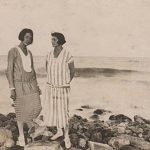 Europeana (Web)
Europeana (Web)
Beschreibung: „In der Web-Ausstellung „Pionierinnen“ werden das Leben und die Arbeit von acht bemerkenswerten europäischen Frauen in Kunst, Wissenschaft und Gesellschaft vorgestellt.
Diese Ausstellung würdigt den historischen Beitrag innovativer Frauen zum Wissen und zur Kultur der Menschheit, von revolutionären Frauenrechtlerinnen bis hin zu brillanten Wissenschaftlerinnen. Die Biografien der ausgewählten Frauen aus ganz Europa reichen vom 16. bis zum 20. Jahrhundert.“
Vorgestellt werden hier:
- Sofonisba Anguissola (1532–1625)
- Maria Sibylla Merian (geb. 1647)
- Madame de Staël (1766–1817)
- Amalia Lindegren (geb. 1814)
- Aletta Jacobs (geb. 1854)
- Maria Sklodowska-Curie (1867–1934)
- Elisa Leonida Zamfirescu (geb. 1887)
- Dora Gabe (geb. 1888)
Die Web-Ausstellung „Pionierinnen“ wurde von Europeana in Kooperation mit der EU erarbeitet. Mariya Gabriel, die europäische Kommissarin für die digitale Wirtschaft und Gesellschaft, verfolgt die Strategie zur Stärkung der Position der Frau in der Gesellschaft und zur Förderung ihrer Beteiligung an der digitalen Wirtschaft.
Das Anliegen von „Pionierinnen“ besteht darin, das Bewusstsein über historische Beiträge von Frauen zur Gesellschaft zu stärken und eine Plattform für die Repräsentation europäischer Frauen, die große professionelle Errungenschaften aufzuweisen haben, zu bieten (Link).
CfP: Historical Roots of Contemporary Trans-Atlantic Phenomena (ZS: Historical Reflections); by: –
 Historical Reflections; Editor: Elizabeth C. Macknight, University of Aberdeen; Co-Editor: W. Brian Newsome, Elizabethtown College (Web)
Historical Reflections; Editor: Elizabeth C. Macknight, University of Aberdeen; Co-Editor: W. Brian Newsome, Elizabethtown College (Web)
Proposals by: no information available
The editors invite submission of articles on the historical roots of contemporary trans-Atlantic phenomena, including but not limited to the gilets jaunes, Black Lives Matter/related European protests, and pandemics such as the 1918 influenza and COVID-19.
Historical Reflections/Réflexions Historiques (HRRH) has established a well-deserved reputation for publishing high quality articles of wide-ranging interest for over forty years. The journal, which publishes articles in both English and French, is committed to exploring history in an interdisciplinary framework and with a comparative focus. Historical approaches to art, literature, and the social sciences; the history of mentalities and intellectual movements; the terrain where religion and history meet: these are the subjects to which Historical Reflections/Réflexions Historiques is devoted.
Manuscript Submission
Articles may be submitted individually or in groups of three to six to Senior Editor Elizabeth Macknight (e.macknight@abdn.ac.uk) and co-editor Brian Newsome (brian.newsome@gcsu.edu). Scholars seeking to coordinate submission of article groups should contact the editors beforehand. Articles should be 7,000-9,000 words in length, and be submitted as email attachments, formatted as Microsoft Word or Rich Text Format files. For further details, including submission guidelines, please refer to the journal’s website.
Have other questions? Please refer to the Berghahn Journals page for general information and guidelines including topics such as article usage and permissions for Berghahn journal article authors (Web).
Historical Reflections is indexed in: • Arts & Humanities Citation Index (Web of Science) • Scopus • Historical Abstracts • ERIH PLUS. For a full listing of indices, please visit the website.
Source: H-Net Notifications
CfP: Food and Sovereignty (ZS: Gender & History); by: 30.09.2020
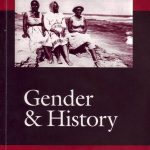 Gender & History; Editors of the special issue: Tracey Deutch, Heidi Gengenbach, Amanda Herbert and Shauna Sweeney (Web)
Gender & History; Editors of the special issue: Tracey Deutch, Heidi Gengenbach, Amanda Herbert and Shauna Sweeney (Web)
Proposals by: 30.09.2020
Gender & History is an international journal for research and writing on the history of femininity, masculinity and gender relations. This Call for Proposals is aimed at scholars studying any country or region, and any temporal period, including the classical, medieval, early modern, modern and contemporary periods.
This Special Issue will examine the ways that the expansive categories of food, gender and sovereignty have intersected over time, shaped by each other and by specific historical circumstances.
Sovereignty and food are intimately entwined. Food has been an instrument of both power and empowerment, a site of negotiation for control of bodies, spaces, states, institutions, identities and the self. What happens in the places food is bought and sold, produced and consumed, imagined and discussed, shapes outcomes and possibilities for historical actors and systems. Food reveals the complexity of relationships among those who assert, retain, lose, reject or attempt sovereign control, whether colonised or coloniser, bound or free. Sovereignty is an expansive category, incorporating not only the consolidation of formal political entities, but also the non-elite, everyday politics of survival and self-determination. We see sovereignty as encompassing the formal claims of governments over land and peoples, and also the ways that individuals, collectives and communities assert control over resources. Whether directed at bodies or abstract polities, sovereignty and food have historically informed one another.
Food is similarly capacious, including liquids, solids and matter that, like Jell-O, refuses easy binaries. It consists of substances considered nourishing and poisonous, is inextricable from medicine, and is absorbed into the body through many means. Food is tied to many needs: budgetary, cultural, economic, emotional, financial, physiological, political, psychological, sacred, sexual, social. Its multidimensional nature makes it both quotidian and extraordinary.
Historically, questions of food and sovereignty have been worked out through gender, which is itself always co-constructed by race and class. Food has been central to gendered regimes of power and the labour that has maintained or undone them (e.g. early modern European „grain riots“; the use of human milk as Continue reading
Klicktipp: Five You Should Know: African American Suffragists (Weblogpost)
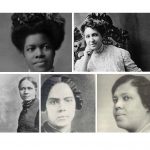 National Museum of African American History and Culture (Web)
National Museum of African American History and Culture (Web)
Description: „The women’s suffrage movement had many heroines who bravely fought for the rights of women in the United States. Here are the stories of five African American suffragists who helped women in America secure the right to vote.“
Meet the following five women:
- Mary-Ann Shadd Cary (1823-1893)
- Frances Ellen Watkins Harper (1825-1911)
- Mary Church Terrell (1863-1954)
- Nannie Helen Burroughs (1879-1961)
- Daisy Elizabeth Adams Lampkin (1884-1965)
The National Museum of African American History and Culture (Web) is located in Washington, DC. It is the only national museum devoted exclusively to the documentation of African American life, history, and culture. It was established by Act of Congress in 2003, following decades of efforts to promote and highlight the contributions of African Americans. To date, the Museum has collected more than 36,000 artifacts and nearly 100,000 individuals have become members. The Museum opened to the public on September 24, 2016, as the 19th and newest museum of the Smithsonian Institution.
There are four pillars upon which the NMAAHC stands:
- It provides an opportunity for those who are interested in African American culture to explore and revel in this history through interactive exhibitions
- It helps all Americans see how their stories, their histories, and their cultures are shaped and informed by global influences
- It explores what it means to be an American and share how American values like resiliency, optimism, and spirituality are reflected in African American history and culture
- It serves as a place of collaboration that reaches beyond Washington, D.C. to engage new audiences and to work with the myriad of museums and educational institutions that have explored and preserved this important history well before this museum was created.
CfP: Transgender Studies Quarterly: Open call issue; by: 30.09.2020
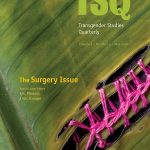 Transgender Studies Quarterly 8.3, Issue Editor: Abraham B. Weil (Web)
Transgender Studies Quarterly 8.3, Issue Editor: Abraham B. Weil (Web)
Proposals by: 30.09.2020
The editors are pleased to invite submissions for TSQ 8.3, the next open call issue, to be published August 2021. The editors welcome works of varying lengths, on any topic that substantively engages with „trans“ as a subject of inquiry, philosophy, methodology, or field of study. The editors especially encourage submissions that consider intersections of trans studies with other fields of study rooted in the critical analysis of minoritized populations such as people of color and people with disabilities, that engage with feminism, challenge trans studies‘ emphasis on the global north, disrupt or productively complicate the dominance of English in trans studies, or which include and esteem the embodied knowledge of trans persons outside of the academy.
TSQ: Transgender Studies Quarterly, published by Duke University Press, is co-edited by Susan Stryker, Francisco J. Galarte, Jules Gill-Peterson Grace Lavery, and Abraham Weil, with editorial offices at the University of New Mexico’s Feminist Research Institute. TSQ aims to be the journal of record for the interdisciplinary field of transgender studies and to promote the widest possible range of perspectives on transgender phenomena, broadly defined. Each volume has three special issues and one general issue. Each issue contains regularly recurring features such as book reviews, arts and culture, interviews, and translations. To learn more about the journal and see calls for papers for other issues, visit the website.
The expected range for scholarly articles is 5000 to 7000 words, and 1000 to 2000 words for shorter critical essays and descriptive accounts. Illustrations should be included with both completed submissions and abstracts. Submissions must be received by September 30, 2020.
To submit a manuscript, please visit the website. For step-by-step submission instructions, please see our submission guide here and style guide here. All manuscripts must be double-spaced, including quotations and endnotes, and blinded throughout. Submissions will include an abstract (150 words or less), keywords (3-5 for indexing), and a brief author’s biographical note (50 words or less) at the time of initial submission. Continue reading
